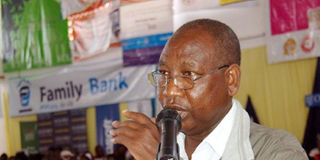Breaking News: Old Kijabe dam tragedy: Death toll rises to 45
Mutula: TSC to independently manage teachers

TSC Secretary Gabriel Lengoiboni. Photo/LABAN WALLOGA
What you need to know:
- TSC Act passed by Parliament on Tuesday last week completely delinks the agency from the parent ministry
- TSC was controlled by the Ministry of Education
- TSC will take over all affairs of the profession - training, deployment, remuneration, inspection and overall quality
Education Minister Mutula Kilonzo has allayed fears of conflict between his ministry and the Teachers Service Commission (TSC) following the enactment of a law rendering the Commission autonomous. (Read: TSC should shape up and pay teachers well)
The TSC Act passed by Parliament on Tuesday last week completely delinks the agency from the parent ministry effectively making it a Constitutional Commission with immense powers and responsibilities.
It is a break from the past where the TSC was controlled by the Ministry of Education as it will now draw its own funds, pay, set standards, discipline and inspect teachers - all by itself.
The new law signals a major shift in the management of teachers in the country, financial provision and appointments with the Education Ministry having been stripped of its powers.
In the new dawn, TSC will take over all affairs of the profession - training, deployment, remuneration, inspection and overall quality – and none of these shall be the concern of the Education Ministry.
This will deal a big blow to the Ministry of Education; especially its quality assurance and inspection directorate whose core business has now been taken over by the TSC.
And unlike before where the TSC funds went through the Ministry of Education it will now draw its funds directly from the exchequer, “and retain money at the close of each financial year for its purposes,” the new law stipulates.
Further, Mr Kilonzo’s powers to appoint the head of TSC and its Commissioners have been stripped, and replaced by a selection panel that will be chaired by a Presidential appointee.
“We are going to maintain an excellent relationship, a complementary arrangement for the delivery of modern education in the country,” the Minister said.
Early this year, TSC boss Gabriel Lengoiboni had written to the Ministry asking the docket to steer clear of management of teachers’ issues in the country.
“Please note that the Commission now derives its mandate from the Constitution of Kenya which grants it power to assign teachers employed in public schools or institutions,” Mr Lengoiboni said.
He was reacting to then Education PS James Ole Kiyiapi who directed that consultations between the ministry and TSC be made regarding deployment and appointment of Principals and other heads of public schools and colleges.
“It should be noted that as much as we welcome consultations regarding deployment and appointment of teachers, the final decision now lies with the Commission," Mr Lengoiboni said.
But the Commission in performing its duties and exercising the new powers “shall consult with State and non-State actors in the education sector.”
It shall also be guided by the national values and principles of governance of public service and shall take into account the best interests of the child as stipulated by the Constitution.
Chair of the Primary Schools Heads Association Joseph Karuga said the headteachers will now get accustomed to reporting to both the Ministry of Education and TSC.
“Our roles are very clear here. The Ministry of Education is responsible for curriculum and infrastructure while the TSC is responsible for teachers affairs,” Mr Karuga said.
Although the new law says headteachers were both managers and teachers of their institutions, the definition on their reporting mechanism has been left silent to avoid a clash in the roles.
Chair of Kenya National Union of Teachers Wilson Sossion, however, said that in case of any conflict in the future, TSC powers and responsibilities were paramount as opposed to the directives from the Ministry of Education.
“Essentially, absolute policy directions for the teachers will emanate from the TSC as they will be answerable to the commission,” Mr Sossion said, citing the current ban tuition.
Mr Sossion said the TSC had the ultimate say in the matter.
And earlier provisions of the TSC law that required teachers to be licensed have been deferred although it could resurface in the regulations that are yet to be drafted to make effective the implementation of the law.
“Every registered teacher shall be required to undertake career progression and professional development… they will also be required to take out a teaching certificate as shall be prescribed,” the law states.
Those who fail to undergo the training, including other refresher courses for teachers, will be struck off the TSC register.
Teachers unions had observed that the training be borne by the TSC, but Parliament noted that the law had indirectly given the commission the requisite power and a range of options to ensure compliance with the training requirement.
The Bill was brought to Parliament for the first time in June this year.
The Commission will now be charged with managing more than 260,000 teachers countrywide.
It will register and keep the records – names and addresses – of every teacher.




